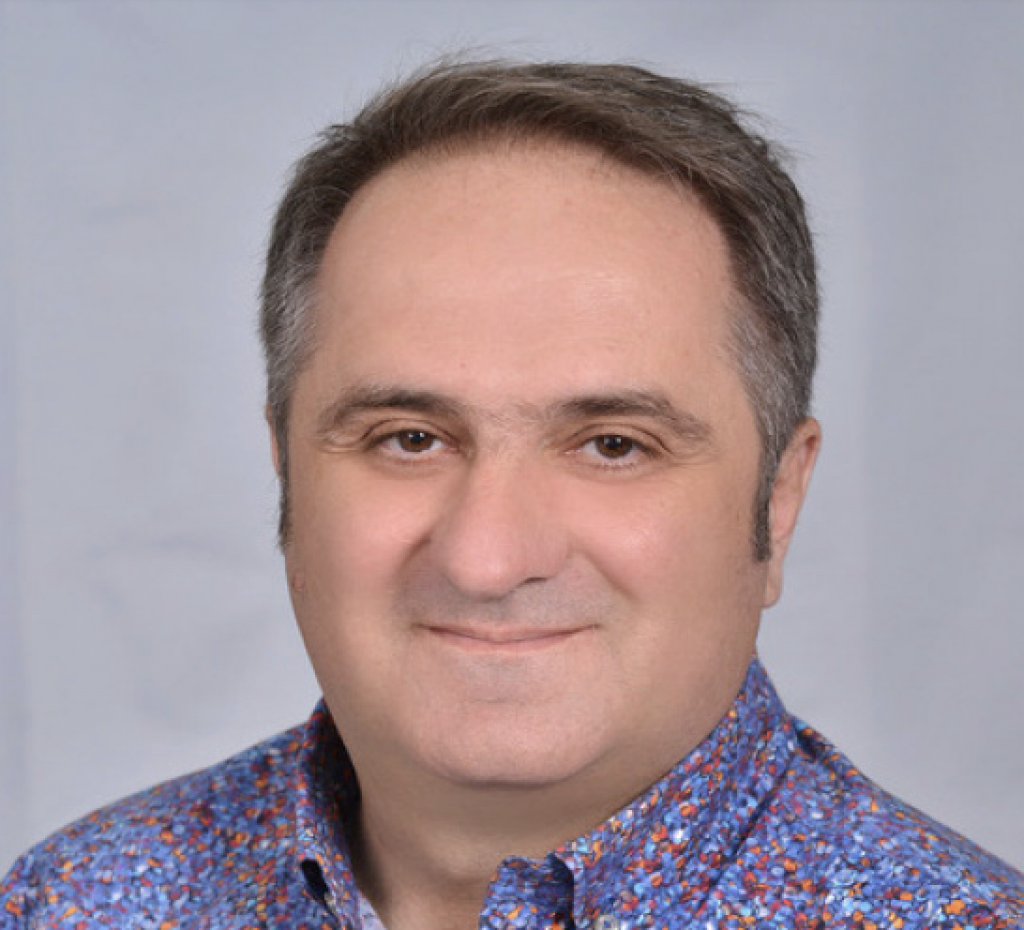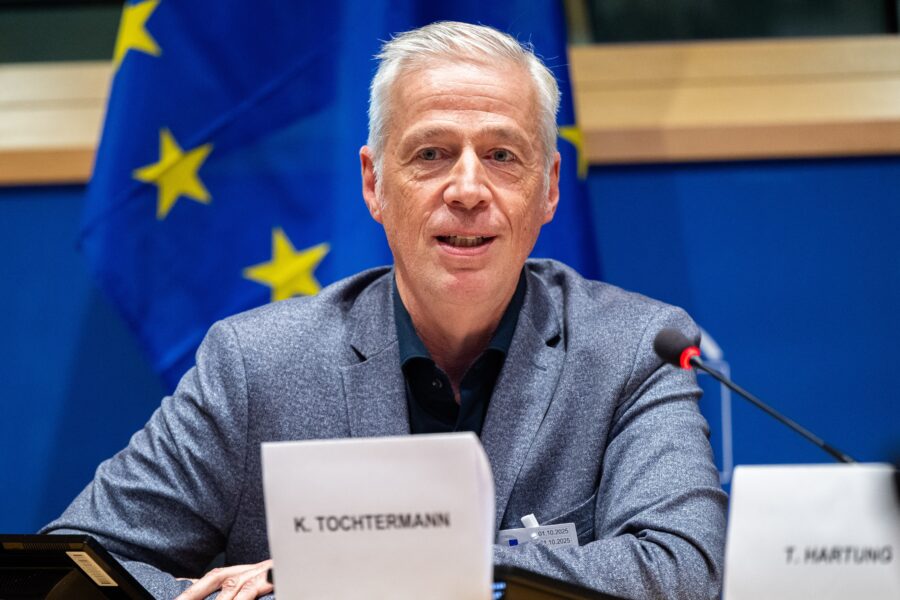North Macedonia’s sole EOSC-A Member, the Faculty of Computer Science and Engineering at Ss. Cyril and Methodius University in Skopje, plays a distinctive role in advancing Open Science in the country.
Committed to enhancing collaboration across southeastern Europe, FCSE drives North Macedonia’s Open Science efforts through the National Open Science Cloud Initiative, NOSCI.mk. The Faculty serves as a crucial link between local research and the broader EOSC community, while also making significant contributions to shaping policies and advocating for regional solutions to challenges such as funding and infrastructure development.
Conducted by Natalia Galica (NCN Poland) and Isabel Caetano (EOSC-A), the interview is the sixteenth in a series coordinated by the EOSC Focus projects, showcasing the contributions and efforts of the EOSC Association’s Mandated Organisations.
What is the role of your organisation in the EOSC Association?
The Faculty of Computer Science and Engineering (FCSE) at Ss. Cyril and Methodius University in Skopje (UKIM) is the only North Macedonian Member of EOSC-A but I would like to see more organisations involved.
Last year, we were appointed by the Ministry of Education and Science as the Mandated Organisation for EOSC-A. Our role is twofold. As the largest e-infrastructure provider in North Macedonia, we host the main Open Science (OS) facilities and services. Additionally, we are also the major research performing organisation in the country.
In 2021, as part of the successful NI4OS-Europe project, FCSE established the National OS Cloud Initiative in North Macedonia, NOSCI.mk. This initiative started with the signing of a declaration by more than 100 researchers, which was followed by a Memorandum of Understanding (MoU) with all state universities and the national research and education network.
What are your main motivations for being a member of EOSC-A?
There are several reasons, for example to be at the forefront of the latest developments in EOSC, to be involved in the policy making and direction of the future EOSC, and to network with all members of the Association.
How does your organisation facilitate the EOSC ecosystem, and how do you translate European developments into the national discussion?
NOSCI.mk serves as the main two-way communication channel. We use it to share information about EOSC with research communities and to assess our stakeholders’ needs and ideas. Based on this, we try to take a national position on what is important within EOSC.
We also have an active role in supporting policy makers, especially the Ministry of Education and Science, in adopting OS policies and practices. As a candidate country for membership in the EU, we are currently going through the process of opening the so-called negotiation chapters. Our experts were part of the delegation for Chapter 25: Science and Research, focusing on EOSC-related activities implemented and planned in North Macedonia.
Looking back at the last few years, we have demonstrated that a regional approach has been successful in coordinating building blocks of the future EOSC. Projects like NI4OS-Europe and EOSC Nordic are proof of this. We have a MoU with most of the countries in southeastern Europe to share our research infrastructures (RIs). There are also initiatives led by the Regional Cooperation Council (RCC), mainly focused on the Western Balkans, aimed at sharing research infrastructures, but also increasing researchers’ mobility. Thanks to this, we aim to operate as a unified research area instead of six small countries doing everything by themselves. Individually, we have limited resources to become a significant player in the European ecosystem.
We also try to bring in the perspective of small associated countries and of our region, which faces a lot of challenges. Because we are not a member of the EU, we don’t have access to all funding opportunities, and we don’t have the required legislation in place. However, we bring diversity and capacity. It is also important for us to be a part of the process and to work with our peers.
How could the EU support needs of countries such as North Macedonia in the context of EOSC?
I can talk about our experience with the last three European Framework Programmes. It would be a good guideline for the future.
In the last twenty years, the countries of southeastern Europe have been working together within successful regional e-infrastructure projects, such as SEE-GRID, HP-SEE, VI-SEEM, GN3, and GN4 to name just a few. We must thank GRnet for leading many of them.
FCSE has developed a strong human capital to support infrastructures, services and training capabilities and to ensure that the knowledge and skills needed are available to all researchers. This is why I would like to see a continued EC support for regional efforts, coupled with national contributions. It should even increase to allow smaller countries to move forward together and be integrated into the architecture of the future EOSC Federation.
Could you share examples of the most relevant national policies for Open Science and EOSC?
North Macedonia’s OS policy is still in the very early stage. As an associate member of the European Strategy Forum on Research Infrastructures (ESFRI), North Macedonia developed the ESFRI Roadmap, with the support of RCC, which identifies OS and EOSC as one of the main drivers for scientific progress.
Recently, the Ministry has taken several important steps to strengthen the national OS policy framework, including the establishment of the National Portal for OS and Open Research Infrastructures. This is an important step towards the adoption of an OS policy, and towards a data-driven governance, with data coming from the community.
The most significant step has been taken by the Regional Cooperation Council, which has supported institutions in the Western Balkans to develop open access policies. Many universities, like ours, have adopted an umbrella policy. Faculties still retain the autonomy to tailor their own versions based on the needs of their respective research areas. The ministry is trying to push forward. For example, if you want to apply for funding to publish a paper, the preprint must be made available in an institutional repository. As a result, universities set up their own repositories.
What resources are available to develop EOSC in your country?
The main EOSC-related developments in North Macedonia have been implemented through projects funded by the European Commission, where FCSE has been a key partner. It started with a small involvement in the EOSC-Hub project, which led to the NI4OS-Europe project, where FCSE led a work package on federation, and onboarding operational mechanisms and tools, as well as a training-related task. Based on the significant success and recognition of the results of this project, FCSE continued to be a partner in several other EOSC-related projects, such as EOSC Future, where we coordinated the activities in the Western Balkans, and EGI-ACE, where we provided support to national research communities regarding EGI services.
FCSE is currently involved in the EOSC Beyond project, in a task aimed at developing the EOSC Sandbox and supporting one of the EOSC pilot nodes, based on the NI4OS-Europe catalogue. Additionally, FCSE plays a key role in the Skills4EOSC project, leading on the development of training materials through FAIR-by-Design Methodology.
At the national level, the Ministry of Education and Science, in its latest call for the modernisation of scientific laboratories and infrastructures, has positively evaluated and co-funded together with FCSE, the new OS Cloud Laboratory (OSC) with a total amount of €0,5 million. It provides HPC, cloud and storage services as well as consultancy to the research community based on open call access. FCSE continues to expand these resources to address the needs across scientific domains. FCSE also maintains UKIM’s publication and data repository and the repo.edu.mk portal, which serves as the national single point of access to all university repositories.
The national funding model allows us to effectively match external resources, e.g. European and national, with our own faculty funding, which comes from various sources, such as student fees and income from collaborative projects with industry.
What are the key areas for improvement?
Some notable areas for improvement are closer collaboration between science and business, and between science and the general public. For the former, many activities have been undertaken to bridge this gap and to offer research infrastructures, research outputs and human potential to companies. As for the latter, a broad public campaign related to citizen science could be helpful. FCSE, in cooperation with the National Television of North Macedonia, produced two episodes of the programme Scientific Spectrum dedicated to OS and EOSC. Watch part 1 and part 2.
What can you tell us about the key challenges for EOSC development in your country?
The main challenges are awareness raising, policy development and, of course, lack of funding. When analysing awareness status and identifying possible target groups for OS training, early-stage researchers, such as PhD students, were selected as the key focus group.
We provide lectures on OS and EOSC as part of the regular PhD programme at the PhD School of UKIM. One of the specific actions FCSE has taken, again with the support of the NI4OS-Europe project, is the appointment of EOSC Promoters. EOSC Promoters are a network of persons active in OS, who act as EOSC and FAIR ambassadors at the national level. They are high-profile individuals who are known in the community and have a wide network to engage stakeholders.
Closer cooperation between scientific communities and policymakers is essential for policy development. A hybrid model, combining a top-down approach from policymakers and a bottom-up approach from researchers, has proven effective in advancing OS implementation. Researchers need to collaborate with policymakers like partners. They have a good understanding of scientific communities, RIs, and related challenges. With strong connections to international initiatives and policies, the next step is to work with policymakers to develop a comprehensive legal framework for OS, addressing all related areas, like for example career development. Currently, FCSE assists the Ministry on OS. We aim for science to play a greater role in governance and decision-making in the future.
Given the lack of a sustainable funding model, we need a more coordinated approach. National funding should be matched by EC-supported initiatives, with a greater focus on regional cooperation, especially for less developed regions and countries.
Could you name some examples that demonstrate the impact of EOSC?
Within the Skills4EOSC project, FCSE initiated the establishment of the OS and Research Data Competence Centre at Ss. Cyril and Methodius University, providing nation-wide services such as training, data management support and tools, templates for policy development, and guidance and support for access and use of the OS Lab.
Which international projects or initiatives do you consider strategic?
FCSE of UKIM is involved in all major e-infrastructure initiatives in Europe. It provides human resources in the GEANT GN series of projects and became a partner in the GN5-1 project. It provides human and technical support to key GEANT coordinated services, such as eduroam and eduGAIN.
Additionally, FCSE coordinates projects funded by EuroHPC JU. It successfully participated in EuroCC and continues to be involved in EuroCC2, strengthening the country’s potential to use HPC, HPDA and AI.
As a member of the EGI Federation, FSCE provides its main national services provider and contributes to the technical coordination of the EGI infrastructure. It has also become an associate member in the PRACE General Assembly. The University is also a member of COARA and a signatory of the Berlin Declaration on Open Access.
We aim at stronger involvement in key ERICs and RIs. Currently, North Macedonian institutions only participate in METROFOOD and CESDA. We need adequate support from policy makers and funders.
Based on your experience, what are your recommendations for the future development of EOSC?
We would like to see a regional approach to the implementation of the future EOSC Federation.
Our country is too small to set up national nodes, and even if we did, they would be modest in size. We discussed with our partners in the region what to do and agreed to submit an application for a regional EOSC Node. However, we are uncertain about funding and the regional legal entity.
Compared to other Members of EOSC-A, FCSE is a small organisation. We believe that through our expertise and commitment to OS, we can contribute to a more accessible and user-friendly EOSC, a strong foundation for future scientific excellence in Europe.
About Faculty of Computer Science and Engineering at Ss. Cyril and Methodius University in Skopje

The Faculty of Computer Science and Engineering (FCSE) at Ss. Cyril and Methodius University in Skopje (UKIM) is among the largest and most prestigious faculties in the field of computer science and technology in the region. With more than 5000 students enrolled in undergraduate, graduate and PhD programmes, FSCE offers a wide range of ICT engineering courses. Researchers at FCSE are leading in the country, measured by their multi-disciplinary research output. The computing centre of FCSE provides e-infrastructure services not only for its faculty, but also for the University and the wider research and education community in North Macedonia. Through membership in key e-infrastructures and initiatives in Europe, such as GEANT, EGI, PRACE, and the EOSC Association, the Faculty has developed a strong human and technical potential to provide necessary support to the national research and education community.
About Anastas Mishev

Anastas Mishev is a professor at the Faculty of Computer Science and Engineering at Ss. Cyril and Methodius University in Skopje. The focus of his research are infrastructures for collaborative computing and Open Science. His goal is to bring these systems closer to potential users, mainly research communities, so they can benefit from their full potential. Mishev has participated in the implementation of over 30 international projects targeting the development of open research infrastructures, with special focus on southeastern Europe. He is one of the founding members of the National Open Science Cloud Initiative in North Macedonia, NOSCI.mk. As a former chairman of the Board of MARNet, the national research and education network in North Macedonia, he continues to serve as a GEANT General Assembly representative. Mishev is a former member of the EOSC Governance Board, and a member of the EOSC Association General Assembly, representing the Mandated Organisation for North Macedonia. He is also a member of the Governing Board of EuroHPC JU, and a representative in the EGI Council and the PRACE Assembly of Members.






